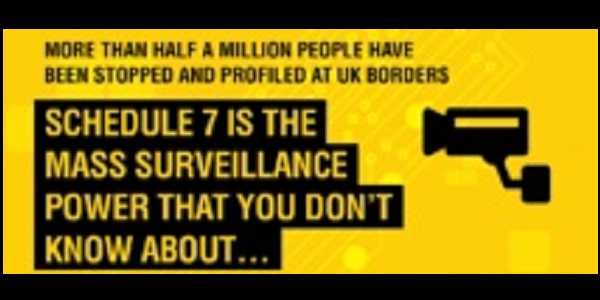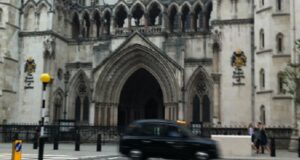“I am willing to go to prison for the principle of privacy for all of us.”
Muhammad Rabbani
I WAS arbitrarily detained at an airport by UK police and asked to hand over the passwords to all my electronic devices. Not wanting to breach client confidentiality, I declined. Now I am facing three months in prison, if found guilty of an offence under a counter terrorism power called Schedule 7.
On previous stops, I had not given my passwords and had been permitted to go on my way. This time, I continued to proceed with the same expectation thinking I was operating within the law and in line with my rights to privacy. I am now facing three months in prison, if I am found guilty.
Why I am willing to go to prison
On the day that I was stopped returning from abroad, I was placed in a very difficult position: I was asked to hand over passwords to my devices and if I didn’t I would end up in prison. There were two reasons why I decided I couldn’t hand over my passwords. Firstly, by handing over my passwords, I would be in breach of client confidentiality. Everyone recognises the need for trust in professional relationships between doctors and patients, lawyers and clients, teachers and students for example.
Had I been asked to disclose my own personal information only, I could take that decision for myself. However, as I was being asked to surrender information that may be related to others – many of whom are vulnerable people seeking legal remedies to abuses they may have suffered – I felt I couldn’t agree to that without the consent of those whose information I held.
Secondly, if I had handed over my passwords, it would have resulted in breach of confidence in a particularly sensitive case my organisation is investigating. This case could lead to the prosecution of perpetrators of torture and link a number of authorities with abuses. By confiscating my devices, the Police have also created an interference now with an ongoing investigation and if this is not resolved, it could lead to the suppression of crucial information that could bring accountability in torture cases.
Why Schedule 7 needs to be challenged
Schedule 7 to the Terrorism Act 2000 is a draconian legislative measure implemented at UK airports, where individuals are stopped, searched and questioned about their lives and views, in an exercise designed to gather intelligence on them.
Though it is currently applied in the framework of the War on Terror, its reach can easily be expanded more broadly as we have witnessed through the David Miranda case.
What is clear from my experience, is that authorities are trying to get a sense of an individual’s beliefs. Not only is this a violation of the fundamental right to freedom of thought and belief, but there is no link between an individual’s political and religious views and ‘terrorism’. Yet this information is recorded and connections are drawn.
There is no transparency at all about how it will be used. We don’t know if it is going to be used to profile certain communities, to design and develop policies, or to assist the state in criminal trials, or as secret evidence, or whether it is shared with other agencies. For this reason, and because Schedule 7 resembles an interrogation and detention-without-charge, it is a violation of the rule of law and our basic rights.
Schedule 7 works as one law in a broader web of counter-terrorism measures that complement one another to criminalise ordinary people, and which can, due to the broad language that defines them, be used beyond the Muslim community.
The threshold for Schedule 7 stops is so low, there doesn’t have to be suspicion associated with your stop. The wording is so vague and broad it’s not even “you’re suspected of”. It’s not even “you’re involved with”, it’s “you appear to be concerned with”. Now “concern” – what does that mean? I mean, I could be an academic studying conflict, and I could be concerned with terrorism for example. I could be a journalist investigating some sort of a crime and I could be concerned with terrorism. I could be anybody.
During a Schedule 7 detainment a person may be shown photographs of other individuals and asked to give information about them. They often have to face unfounded, fearful allegations of being linked to “terrorism”. It is nothing short of injustice and intimidation.
This has broad implications for people who need to protect their data
This case is not only about me or CAGE. If I give in, this has broad implications for others who want to protect similar relationships and ethics in the face of an encroaching security state. For this reason, my case on Monday will set a crucial precedent not just for Muslims, but for all society.
But beyond the effects on the individual, it is astonishing that this law has been in power, with little challenge for 15 years. Authorities have been gathering data on individuals for this long, at the rate of between 20,000 and 50,000 people a year. Such excessive surveillance and intimidation must be challenged. This is affecting the lives of thousands and thousands of people.
The presumption of innocence is a basic right and Schedule 7 needs to be brought in line with the rule of law. I am disappointed that not more has been done. Sometimes the right thing to do is to say the law is wrong. Therefore the only correct thing to do is to resist.
The importance of privacy
Privacy is something that lies close to my heart. As a Muslim, privacy is much valued in Islam and we are commanded not to spy on others. The presumption of innocence before guilt is also a founding principle.
With everything digitalised now, and with increasing threats to individual rights around the world, we have a right to demand and protect our privacy, especially those who are responsible for protecting the rights of others in the face of oppressive authority. This notion goes to the heart of British values. Yet, it is those values that are being destroyed.
We have to ask ourselves how much we value these principles. This is about taking a risk to protect the rule of law. This is everything I have learned from CAGE. CAGE is built on this principle: that the rule of law should apply to everybody. This is a central theme of our work. When it comes to the fight against terrorism, this has been hijacked and the dialogue has been twisted so people don’t think the rule of law is necessary.
Equal laws for all?
The 20th century philosopher John Rawls imagined a scene in his book A Theory of Justice where a group of people would be required to design laws for the benefit of a future society – the catch being that they would die at the end of the process and be woken up not knowing what their position in the new society would be.
The reality of counter-terrorism policy is this: that those making the laws would never allow for themselves to be subjected to the same treatment – no one would wish to wake up one day with all the suspicion that accompanies being a Muslim.
I mentioned earlier that I refused my password for two reasons: client confidentiality and desire to protect a torture survivor. That was when I was arrested. Now after having gone through the experience of being treated like a criminal, I feel differently.
The experience has made me think that the problem is more fundamental than that: password protection should be a basic right and no one should be required to reveal their passwords if they have not been formally accused or charged with a crime.
I hope by taking this stand, that others are inspired to follow. When the rule of law is disregarded or applied selectively to only a few, then we have to ask ourselves what we are willing to risk for a more equal and just society – for the sake of all.
About CAGE
CAGE is an independent advocacy organisation that works to empower communities affected by the War on Terror and to highlight abuses of due process. At the heart of its work is a belief that dialogue, conflict resolution and respect for the rule of law are essential for a just society. For more information, go to:
https://cage.ngo/
Read more about it:
CAGE director faces prison to protect privacy
https://eastlondonnews.co.uk/cage-director-faces-prison-to-protect-privacy/
Facing prison to protect privacy – what others say
https://eastlondonnews.co.uk/facing-prison-to-protect-privacy-what-others-say/
[Adverts]
 East London News A Force for the community…
East London News A Force for the community…




